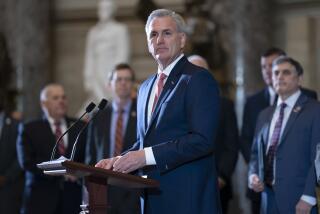Rove unmasked
- Share via
NOW THAT the Harriet E. Miers nomination has officially gone down in flames, it’s time to admit what many of us have always known: Karl Rove really is George W. Bush’s Svengali.
For years, conservatives have treated the notion that Rove is the mastermind behind Bush as some sort of loopy conspiracy theory concocted by Bush-hating liberals. Andrew Ferguson’s take in the Weekly Standard last year is typical: “[Bush’s] Democratic adversaries have obsessed over piecing together odd, paranoid caricatures of the man who’s driving them nuts -- Bush as the agent of Halliburton, Bush as the idiot son of robber baron privilege, Bush the religious crank, the right-wing ideologue, the draft dodger, the front man for Enron or Rove or the Saudi royals or J.R. Ewing.”
Got that? Those of us who think Bush is an agent of Rove rank right along with those who think that he’s the agent of a fictional character from a television series.
The reason conservatives have been so invested in downplaying Rove’s influence, of course, is that the notion of an all-powerful advisor speaks poorly of the president. One book-turned-documentary labeled Rove “Bush’s Brain.” If Rove is Bush’s brain, then Bush doesn’t have much of a brain of his own, and Republicans don’t like that idea one bit.
And yet the evidence has become increasingly hard to deny. After Bush won reelection, he granted Rove all-encompassing power over his domestic agenda. Rove is now overseeing the White House Domestic Policy Council, National Economic Council, National Security Council and Homeland Security Council. This was simply a formal recognition of the de facto power that Rove had wielded all along.
It’s hard to prove something definitely, though, without the aid of a controlled study. And the Miers fiasco offers the best proof of Rove’s influence.
There is a consistent pattern to Rove-driven decisions. He has an unerring sense of what the conservative base demands and what deviations it will tolerate. Rove may lose a battle every so often, but that happens only when Democrats have a chance to stop him (i.e., Social Security privatization). He always holds the Republican Party together. The result is sometimes a substantive disaster -- no, make that usually a substantive disaster -- but as a political formula, it works.
But in the case of Miers, Rove was out of the picture, distracted by his potential indictment in the Valerie Plame/CIA scandal. As the New York Times reported last week, “Some conservatives and Rove allies say [Chief of Staff Andrew] Card kept Mr. Rove in the dark about the seriousness of Mr. Bush’s intentions until very late in the process, thus sidestepping the advisor who would have been best able to anticipate dissent among Republicans.” This is what scientists call “isolating the independent variable.”
The result was a disaster that bore none of the hallmarks of your normal Rove-driven strategizing. The outreach to the base was almost nonexistent. The smear campaign against the critics was clumsily handled. The Bush who made this selection bears almost no resemblance to the Bush we’ve grown accustomed to.
Ironically, the very fact that Rove is facing indictment is causing some of Bush’s staunchest allies to admit Rove’s influence at last.
In the latest issue of the Standard, Fred Barnes calls Rove “irreplaceable.” Rove “made Bush more conservative,” writes Barnes, and now that he’s tied up with Plamegate, “Bush appears to be drifting ideologically.”
What happened to Bush having thoughts of his own? I’ll tell you what. Rove desperately needs conservatives to rally behind him to keep his job or maybe to stave off prison.
So now the pretense that Rove was never pulling the strings behind the surface has been dropped for the more immediate imperative of saving his hide.
All of this suggests two things.
First, if the Plame scandal takes Rove out of commission, Bush’s second term might look awfully ugly.
And second, maybe we Bush-haters weren’t just a bunch of paranoid conspiracy theorists after all.
More to Read
Get the L.A. Times Politics newsletter
Deeply reported insights into legislation, politics and policy from Sacramento, Washington and beyond. In your inbox twice per week.
You may occasionally receive promotional content from the Los Angeles Times.










